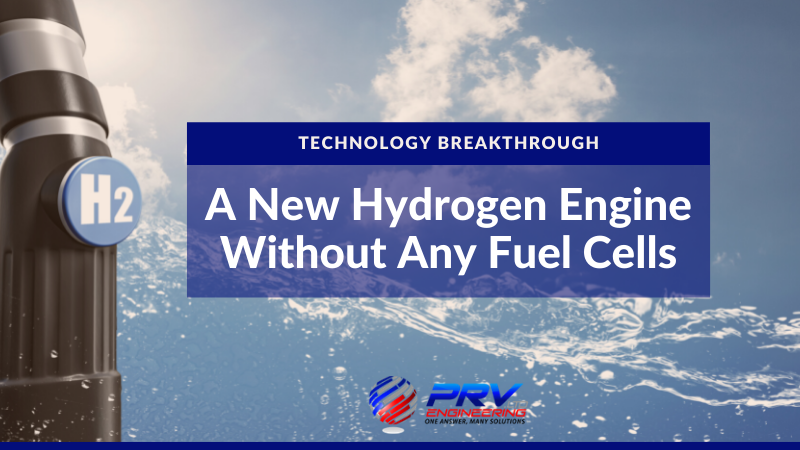
Using hydrogen as a fuel poses many challenges due to its high flammability, diffusivity and very low density as a gas. Storing it is another issue along with the difficulty in processing it as some methods are not sustainable. However, all that could be a thing of the past with a new small 22-lb hydrogen engine that could effectively replace the internal combustion engine.
How Does The Small Hydrogen Engine Work?
Aquarius Engines, an Israel-based company, unveiled a small hydrogen engine that could eliminate the global reliance on hydrogen fuel cells and fossil fuels. The hydrogen engine only weighs 22 pounds or 10 kg and is a single-piston-linear engine with only 20 components and one moving part. That means the hydrogen engine is much cheaper to produce and maintain compared to traditional combustion engines.
The company held off from unveiling the engine until after a series of tests from Austrian engineering firm AVL-Schrickits. It confirms that a modified version of the original Aquarius Engine can indeed fully operate on Hydrogen.
The company hasn’t released much about the specifications except that the lightweight design and unique internal-gas-exchange-method would greatly reduce emissions and lower the global carbon footprint.
The Future Of Affordable, Green And Sustainable Energy
To try and reverse global warming and drastically reduce greenhouse gases, the UK for example has committed itself to reduce 57% of emissions by 2030, and 80% by 2050. The only way to reach those ambitious targets will be low-carbon, renewable energy and this type of hydrogen engine could be the answer across the globe. Here’s what the execs at Aquarius Engines had to say:
“It was always our dream at Aquarius Engines to breathe oxygen into hydrogen technology as the fuel of the future,” said Gal Fridman, Chairman of Aquarius Engines.
“From initial tests, it appears that our hydrogen engine, that doesn’t require costly hydrogen fuel-cells, could be the affordable, green and sustainable answer to the challenges faced by global transport and remote energy production. As the world moves away from fossil fuel, our new hydrogen engine could spark the dawning of the Age of Aquarius.”
Hydrogen Engine Versus Electric
In a recent article, we spoke about electric and hydrogen aircraft but the truth is, upscaling this hydrogen engine into aeroplanes is unlikely anytime soon. Either way, it’s an exciting prospect as Aquarius Engines have potentially opened the door to so much more.
Of course, the financial incentive is always a factor to consider and a hydrogen engine could play a massive part. It will likely determine whether we drive electric or hydrogen cars at a mass scale. But, the biggest advantage is that a hydrogen engine is much cheaper than hydrogen fuel cells.
According to the company, its hydrogen engine doesn’t even need lubrication for maintenance which is simply staggering. That said, it will probably take a lot more to change the current trend in electric vehicles as you will see in the next section.
Making A Case For Hydrogen Vehicles
Recently, Volkswagen Auto Group CEO, Herbert Diess, publicly criticised hydrogen cars on Twitter and stated that they are backing electric vehicles. Elon Musk also commented saying that “Diess is right. Hydrogen is a staggeringly dumb form of energy storage for cars. Barely worth considering it for a rocket upper stage, which is its most compelling use.”
Even though these industry leaders are backing electrification, that doesn’t mean companies aren’t exploring hydrogen fuel as a sustainable method for transportation. Fact is, Segway is one of them showing off its next-level Tron-inspired hydrogen-fuelled motorbike.
Also, Aquarius Engines recently announced partnerships with auto-parts manufacturers TPR and Honda-affiliate, Musashi Seimitsu. Not a surprising collaboration as Japan is one of the few countries that have bet big on hydrogen as part of its Green Growth Strategy.
Conclusion
Aquarius Engines unveiled the first version of its 22-lb engine in 2014 but that didn’t run solely on hydrogen. It was specifically designed as an onboard power generator in vehicles or as a stationary electricity generator.
This is just the beginning as we could see some interesting developments in the not so distant future. Its companies like Tesla and Aquarius Engines, among others that are driven toward making a change and creating a greener future. From the available information, this hydrogen engine looks exceptionally promising and could take us to the next level of sustainable transport.
For more fascinating updates on all things technology, engineering and manufacturing, please follow our blog and join us on social media. You can find us on Twitter, Facebook, YouTube or LinkedIn and remember to use the hashtag #PRVtech.


 Mail:
Mail: 



